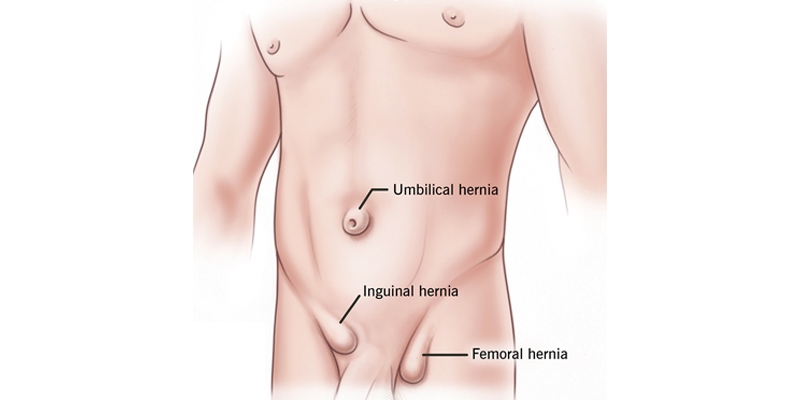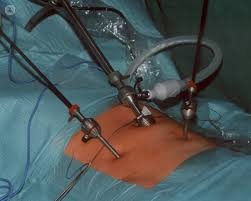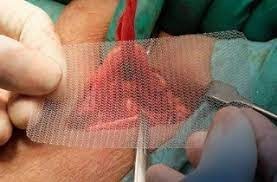Hernia Overview :
A hernia occurs in the abdomen when a piece of tissue or an organ sticks out through one of the weakened muscle walls that surround the abdominal cavity. The sac that swells through the weak muscle area in the groin or abdominal wall contains the fatty lining of the colon or a piece of intestine.
In case if a hernia occurs via the diaphragm, the muscles that separate the abdomen from the chest, then the sac may contain a part of the stomach. They are the most common in the stomach, but they can also appear in the groin areas, belly button, and upper thighs. In most cases, hernias are not life-threatening, but they don’t go on their own. They might require hernia operation or hernia surgery to prevent potentially hazardous complications.
Common Types of Hernia
There are mainly four types of hernias affecting the humans
- Inguinal Hernia:
It is one of the most common types of hernia making up to 75%. Inguinal hernias arise when the intestines tear or push through the weak spot in the lower abdominal wall, mostly in the inguinal canal.
In men, inguinal canal found in the groin where the spermatic cord passes to the scrotum from the abdomen. In women, the inguinal canal holds the ligament that helps seize the uterus in place.
Men are affected more with an inguinal hernia than women because their testicles are descended through the inguinal canal right after they are born. Thus, men undergo inguinal hernia treatment as a resolution.
- Hiatal Hernia:
This type of hernia occurs when a piece of your stomach tissue sticks out through your diaphragm into your chest cavity. A hiatal hernia is a common disorder amongst individuals aged 50.
- Umbilical Hernia :
This type of hernia is the most common in newborns under 6 months old. An umbilical hernia occurs when a child’s intestine bulge through his/her weak abdominal wall.
- Incisional Hernia :
An incisional hernia occurs rarely after you have undergone an abdominal surgery.
Signs and Symptoms of Hernia :
The most common sign of hernia occurrence is the formation of lump or bulge in the affected area. In case of an inguinal hernia, you may notice bulginess on either side of your pubic bone where your thigh and groin meet. You can feel your hernia by touching during when you bend down, cough, or stand up.
signs and symptoms of an inguinal hernia :
- Aching, gurgling, or burning sensation at the site of the lump
- Experiencing heaviness, pressure, or weakness in the abdomen
- Discomfort or pain in the affected area while lifting, coughing, or bending
signs and symptoms of a hiatal hernia :
- Difficulty in swallowing
- Chest pain
- Acid reflux
signs and symptoms of an umbilical hernia :
- Your baby might have a hernia is he/she has a bulge near the belly button
Diagnosis of Hernia :
The best doctor for hernia will make sure to perform all the tests and diagnosis to determine the type of hernia in the patients. Vivanta doctors prefer several methods and tests to diagnose certain hernias, they include;
- Incisional or inguinal hernias are diagnosed via a physical examination
- Hiatal hernia is diagnosed using endoscopy or with a barium x-ray
- Umbilical hernia is diagnosed using ultrasound
Further, a CT scan or MRI is also performed for diagnosing a hernia
Hernia Repair Surgery, Operation and Treatment :
Laparoscopic hernia repair surgery / operation is considered the best treatment option for hernia. However, it will depend on the symptoms and the size of your hernia to determine the treatment options.
The possible treatment options for hernia include:
Surgery / Operation : You will require an inguinal hernia surgery / operation if your hernia is causing pain or is growing larger. Laparoscopic surgery / operation is considered the most common surgery for hernia. It involves miniaturized surgical equipment and a tiny camera along with few small incisions. However, it requires long recovery processes and you may not be able to move freely or normally for 5-6 weeks.
Medication : Hiatal hernias can be treated using certain prescribed medications that condense the stomach acid. Proton pump inhibitors, H2 receptor blockers, and antacids are the potential medicines for hiatal hernias


